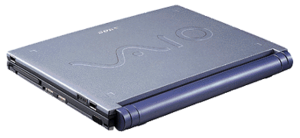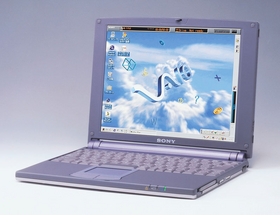PCG-505: Difference between revisions
More actions
No edit summary |
|||
| (26 intermediate revisions by 4 users not shown) | |||
| Line 1: | Line 1: | ||
{{Infobox Specs | |||
| name = PCG-505 | |||
| image = PCG-505.png | |||
| subtitle = PCG-505 | |||
| series = Note 505, バイオノート505 | |||
| rel = 1997 | |||
| cpu = Intel Pentium MMX 133MHz, 200MHz, 233MHz, 266MHz | |||
| gpu = NeoMagic MagicGraph 128ZV+ NM2097 (approx. 1.1MB VRAM) | |||
| chipset = Intel 430TX | |||
| memory = 32MB SDRAM, maximum 64MB | |||
| display = 10.4" 800x600 LCD, Toshiba LTM10C272S | |||
| storage = 2.5" IDE 1GB, 2.1GB, 4.3GB, 6.4GB | |||
| audio = ESS AudioDrive ES1879 (Sound Blaster Pro compatible) | |||
| os = Microsoft Windows 95 | |||
| weight = 1.35kg (2.98lbs) | |||
| size = 259 x 208 x 23.9mm | |||
| msrp = $2000 to $2700 US | |||
}} | |||
== Overview == | == Overview == | ||
The Sony VAIO PCG-505 (also known as バイオノート505 in Japan, translated to BioNote 505) was a high-end subnotebook released by Sony in November 1997, thus being the 2nd VAIO laptop to be released, only a couple of months after the [[PCG-7**]] series. It was one of the thinnest and lightest laptops at the time, being only 23.9mm thick and weighing a staggering 1.35kg. Sony used the "MicroNotebook" (1997-1998), and "SuperSlim" (1998-1999) marketing moniker to underline its unique form factor at the time. | |||
The Sony VAIO PCG-505 was a high end subnotebook released by Sony in | [[File:PCG-505 back.png|thumb]] | ||
The PCG-505 introduced the iconic VAIO cylinder look (the purple look being introduced by the PCG-7**) and used a magnesium alloy chassis all around to reduce the weight of the machine. It adopted various design elements to make it more unique, such as the cylindrical battery, but also the matching accessories that could be bought with the laptop. | |||
' | The 505 included a stylus on the left side of the display that was able to draw on the trackpad. Next to the power button, located on the right side of the machine, is a programmable button, customizable by Sony's software. | ||
[[File:PCG-505 Stylus.png|thumb|Stylus in action]] | |||
For Japanese models, the 505 included Navin' You, a map viewer software, with a map of Tokyo preinstalled. It also included PictureGear, a photo management program able to be linked with a Sony Cyber-shot or Mavica. | |||
' | A number of optional accessories were available for purchase, like external speakers that could be attached to both sides of the display (similar to the [[PCG-QR3]]'s external speakers), an external PCMCIA optical drive, a dock with matching purple casing, or an extended battery. | ||
[[File:PCG-505 IO.png|thumb|PCG-505 I/O]] | |||
' | ==Daily Usage Today== | ||
These days, laptops of this age are only suitable for retro gaming and offline usage, such as editing basic text documents and spreadsheets, and it isn't adequate for running Windows games either, you are better off playing DOS games on it. | |||
==Resources== | |||
If a link is broken, please input the URL in the [http://web.archive.org Wayback Machine]. | |||
====Recovery Discs ==== | |||
These discs are not compatible with [[Sony VAIO Recovery Patcher (SVRP)|SVRP]], but we are working on a patcher for earlier recoveries. | |||
{| class="wikitable" | |||
|- | |||
|PCG-505||[https://archive.org/details/vaio-pcg-505-recovery-CD Internet Archive] | |||
|- | |||
|PCG-505X/PCG-505EX | |||
|[https://archive.org/details/sony-vaio-pcg-505-x-product-recovery-cd Internet Archive] | |||
|- | |||
|PCG-505V||[https://archive.org/details/pcg-505v-recovery-cd Internet Archive] | |||
|- | |||
|PCG-505G||[https://archive.org/details/sysrec_sony-PCG-505G Internet Archive] | |||
|- | |||
|PCG-505RS||[https://archive.org/details/vaio-pcg-505rs-recovery-cd Internet Archive] | |||
|- | |||
|PCG-505TS/TX ||[https://archive.org/details/pcg505tstx Internet Archive] | |||
|- | |||
|PCG-505G HDD image||[https://archive.org/details/vaio-pcg-505g-win98-oem Internet Archive] | |||
|- | |||
|PCG-505X HDD image||[https://archive.org/details/505x-japan-win-95-oem Internet Archive] | |||
|} | |||
====Manuals and Useful Links==== | |||
{| class="wikitable" | |||
|+Manuals | |||
|- | |||
|User Guide EN (1998)||[https://download.vaiolibrary.com/manuals/pcg-505/PCG-505_User_Guide_1998.pdf PDF] | |||
|- | |||
|User Guide EN (1999)||[https://download.vaiolibrary.com/manuals/pcg-505/PCG-505_User_Guide_1999.pdf PDF] | |||
|- | |||
|User Guide JP (1997)||[https://download.vaiolibrary.com/manuals/pcg-505/PCG-505_JP_User_Guide_1997.pdf PDF] | |||
|- | |||
|Service Manual||[https://download.vaiolibrary.com/manuals/pcg-505/PCG-505_Service_Manual.pdf PDF] | |||
|- | |||
|About Your PCG-505||[https://download.vaiolibrary.com/manuals/pcg-505/PCG-505_About_Manual.pdf PDF] | |||
|- | |||
|CRX55A Optical Drive Manual||[https://download.vaiolibrary.com/manuals/pcg-505/PCG-505_CRX55A_Optical_Drive_Manual.pdf PDF] | |||
|- | |||
|CRX76A Optical Drive Manual||[https://download.vaiolibrary.com/manuals/pcg-505/PCG-505_CRX76A_Optical_Drive_Manual.pdf PDF] | |||
|} | |||
= | {| class="wikitable" | ||
|+Presentation Pages | |||
|- | |||
|PCG-505||[https://www.sony.jp/products/Consumer/PCOM/VAIO/Note505/index.html Sony JP] | |||
|- | |||
|PCG-505X/EX||[https://www.sony.jp/products/Consumer/PCOM/VAIO/Note505EX/index.html Sony JP] | |||
|- | |||
|PCG-505G/GX||[https://www.sony.jp/products/Consumer/PCOM/Note505GX/top.html Sony JP] | |||
|- | |||
|PCG-505R/RS/RX||[https://www.sony.jp/products/Consumer/PCOM/Note505RX/index.html Sony JP] | |||
|- | |||
|PCG-505S/SX||[https://www.sony.jp/products/Consumer/PCOM/Note505S/index.html Sony JP] | |||
|- | |||
|PCG-505V||[https://www.sony.jp/products/Consumer/PCOM/NOTE505/index.html Sony JP] | |||
|} | |||
== | ====Guides==== | ||
{| class="wikitable" | |||
|- | |||
|PCG-505 Disassembly Video||[https://www.youtube.com/watch?v=kLHdqfpHflI YouTube] | |||
|- | |||
|PCG-505 Disassembly||[http://www.fieros.de/vaio/disass.html fieros.de] | |||
|} | |||
==Credits== | |||
= | [https://sony.com Sony], [[wikipedia:Sony_Vaio_505_series|Wikipedia]], [https://www.youtube.com/watch?v=5z-DcHPdkKk TDNC YT] | ||
Latest revision as of 14:23, 26 April 2025
Overview
The Sony VAIO PCG-505 (also known as バイオノート505 in Japan, translated to BioNote 505) was a high-end subnotebook released by Sony in November 1997, thus being the 2nd VAIO laptop to be released, only a couple of months after the PCG-7** series. It was one of the thinnest and lightest laptops at the time, being only 23.9mm thick and weighing a staggering 1.35kg. Sony used the "MicroNotebook" (1997-1998), and "SuperSlim" (1998-1999) marketing moniker to underline its unique form factor at the time.

The PCG-505 introduced the iconic VAIO cylinder look (the purple look being introduced by the PCG-7**) and used a magnesium alloy chassis all around to reduce the weight of the machine. It adopted various design elements to make it more unique, such as the cylindrical battery, but also the matching accessories that could be bought with the laptop.
The 505 included a stylus on the left side of the display that was able to draw on the trackpad. Next to the power button, located on the right side of the machine, is a programmable button, customizable by Sony's software.

For Japanese models, the 505 included Navin' You, a map viewer software, with a map of Tokyo preinstalled. It also included PictureGear, a photo management program able to be linked with a Sony Cyber-shot or Mavica.
A number of optional accessories were available for purchase, like external speakers that could be attached to both sides of the display (similar to the PCG-QR3's external speakers), an external PCMCIA optical drive, a dock with matching purple casing, or an extended battery.

Daily Usage Today
These days, laptops of this age are only suitable for retro gaming and offline usage, such as editing basic text documents and spreadsheets, and it isn't adequate for running Windows games either, you are better off playing DOS games on it.
Resources
If a link is broken, please input the URL in the Wayback Machine.
Recovery Discs
These discs are not compatible with SVRP, but we are working on a patcher for earlier recoveries.
| PCG-505 | Internet Archive |
| PCG-505X/PCG-505EX | Internet Archive |
| PCG-505V | Internet Archive |
| PCG-505G | Internet Archive |
| PCG-505RS | Internet Archive |
| PCG-505TS/TX | Internet Archive |
| PCG-505G HDD image | Internet Archive |
| PCG-505X HDD image | Internet Archive |
Manuals and Useful Links
| User Guide EN (1998) | |
| User Guide EN (1999) | |
| User Guide JP (1997) | |
| Service Manual | |
| About Your PCG-505 | |
| CRX55A Optical Drive Manual | |
| CRX76A Optical Drive Manual |
| PCG-505 | Sony JP |
| PCG-505X/EX | Sony JP |
| PCG-505G/GX | Sony JP |
| PCG-505R/RS/RX | Sony JP |
| PCG-505S/SX | Sony JP |
| PCG-505V | Sony JP |
Guides
| PCG-505 Disassembly Video | YouTube |
| PCG-505 Disassembly | fieros.de |

